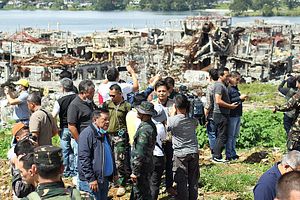Last week, the Philippines moved forward with a national action plan for preventing and countering violent extremism. As is the case with the development of such initiatives in other countries, the spotlight on the plan pointed to the comprehensive list of issues that the Southeast Asian state needs to address in order to address the narrower issue of counterterrorism that often dominates the headlines.
As I have noted before in these pages, amid the broader focus on the latest wave of terrorism stemming from the Islamic State and other linked groups over the past few years, within Southeast Asia, the Philippines has been among the countries that has been most affected by this, and concerns continue to remain about the future trajectory of the threat there. But as with other countries, there have been concerns about how the government balances responding to immediate crisis, such as the one in Marawi that struck in 2017, with the longer-term, comprehensive challenges of preventing and countering violent extremism.
Among the initiatives that had spotlighted this issue was the development of the Philippines’ National Action Plan on Preventing and Countering Violent Extremism (NAP PCVE). This follows plans that have been adopted by other countries as well as growing involvement by partner countries such as the United States and multilateral organizations including the United Nations, with the secretary general introducing a plan in 2016 and the UN Office of Counterterrorism launched in 2017.
Last week, the Philippines’ counterterrorism approach was in the headlines again with the approval of its NAP PCVE. The plan, which was approved by the Anti-Terrorism Council, was announced at a government forum on Wednesday, and its goal will be to undertake a comprehensive approach to addressing terrorism and violent extremism in the Philippines, engaging a wide range of stakeholders including communities, schools, and social media groups, and led by the Department of the Interior and Local Government (DILG) in addition to other government agencies.
While details are still unclear, Philippine officials have said the focus will be on a wide range of aspects tied to counterterrorism and deradicalization, including education, detention, and deradicalization policies. Interior Secretary Eduardo Ano, who was the armed forces chief in response to the Marawi crisis, told Kyodo News that among the focus areas would be working with religious leaders and educators on issues such as education and youth deradicalization.
With officials now confirming the release of NAP PCVE, the focus will shift onto its implementation. Per , the Duterte government expects to follow up with several additional measures, including an executive order from the president to delineate responsibilities as well as consultations with a wide range of stakeholders. And as with other national plans of this sort, the big question observers will be looking to answer is the extent to which government actions align with the words that appear in the NAP PCVE, and how any perceived gaps can be narrowed in the coming years.

































